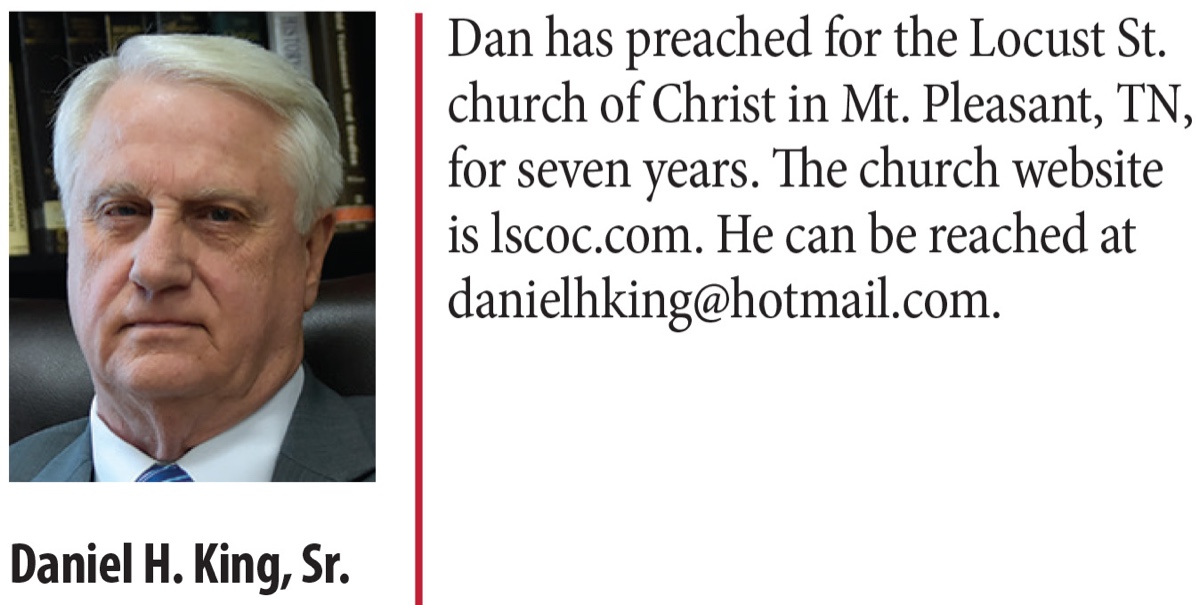by Daniel H. King, Sr.
Synopsis: In antiquity, the teachers shared a close relationship with their students. Jesus spent three years in constant daily association with the twelve. The daily growth of the early church was connected with their daily association (Acts 2:46-47).
Over the past two years of restrictions associated with the viral pandemic, many Christians, like much of the general population, have pulled back from their regular manner of doing things in fear of contracting the disease, or else simply because others feared getting the virus from us. Now that this period is past, one activity that needs to return to “normal” is the business of bringing disciples of Jesus to a more mature level of spiritual growth. This is an aspect of the Christian system that must not be neglected, for the Lord instructed us to do this until He returns: “Go therefore, and make disciples of all the nations, baptizing them in the name of the Father, and the Son, and the Holy Spirit, teaching them to observe all that I have commanded you. And behold, I am with you always, even to the end of the age” (Matt. 28:19-20, emphasis mine). The apostles of Christ were persistently engaged in this activity from that day forward (cf. Acts 14:21; etc.).
This is part of our Christian duty that must not be neglected, but has been for too long (for whatever reasons). Now that we are back to a “face-to-face” situation in society generally, making stronger disciples must be something that is carried on with a renewed vigor and enthusiasm for God’s people in the same way that many are returning to their jobs and livelihoods now that this dark period of our history is over.
According to the divine pattern set forth in the Lord’s instructions in this important text, disciples are first to be made (which is done by teaching the first principles that lead to conversion), and then they are to be taught all the Savior’s other commands. Making and teaching disciples is an ongoing process in the life of the church, and neither aspect should be neglected. Prior to conversion, one only needs to understand a limited range of truths that are necessary for them to decide whether they want to follow Jesus. Afterward, there is much more that needs to be taught and learned. This latter aspect is a lifelong process.
The Greek word “disciple” (mathētēs) is derived from the verbal root manthanō, and its meaning is “to learn” or “to understand.” One becomes a disciple of Christ when he learns that Jesus is Lord and comes to understand the necessity of faith, repentance, confession and baptism, and does what is required of him in this regard. These are classified in the Bible as “the rudiments of the first principles of the oracles of God” (Heb. 5:12), and are also referred to as spiritual “milk” as opposed to spiritual “meat.”
A person becomes a mature disciple by means of learning the more advanced doctrines of the faith, and then eventually grows to spiritual adulthood (see Heb. 6:1-2). This is a necessary process. There is no possibility of short-circuiting it without dire consequences. Even the Son of God became a disciple while on earth, learning (emathen, from manthanō) the ways of obedience “by means of the things he suffered” (Heb. 5:8). The author of Hebrews warns that some of their number had failed fully to matriculate through this process, and so had “fallen away” rather than passing successfully beyond the more advanced course of study (6:6). All such learning occurs by two means: study and application. This is the way we learn everything: first we come to know it, and then we put it into practice and make proper application. So, failing to complete this process has the potential to have undesirable consequences, as the author of Hebrews goes on to say.
Unfortunately, there are a great many disciples of the Lord who were caught at a bad time in that learning curve of which we speak here when they were first led to Christ. Soon afterward, a pall fell upon human society comparable to a biblical plague on the earth. Unless they were followed up with by telephone, mail, or email, or by means of Zoom calls, or other methods, some of them had their growth arrested at a minimal level of spiritual development. If you can think of someone who fits that scenario in your local congregation, or even in your circle of friends, then someone needs to follow up with them, and instruct them at a higher level. We can only hope and pray that their development was not permanently affected by this world-wide panic that has surrounded us during the last several years.
The New Testament is replete with exhortations for us to persist in this wholesome activity, whether it is performed in the building where the church assembles, or in the homes of the members, or even at alternative sites. One of the most important passages that we encounter is 2 Timothy 2:2, which says, “. . .and the things that you have heard from me in the presence of many witnesses entrust to faithful men who will be able to teach others also.” In this text, Paul told Timothy to train others to train still others—ad infinitum. As long as the process continued and was not stopped by some means or other (as in the case of a pandemic!), it would never end until the Lord returns. This was precisely the Lord’s intention. We must therefore redouble our efforts to make up for lost time!
The Bible contains many other such encouragements to be faithful in this continuous, never-ending effort. For example:
As long as there are young children still needing instruction, this work cannot cease. Hopefully, while all this chaos has surrounded us, this important teaching has gone forward apace. Many children have been away from the teaching environment of the schoolhouse, but that has only meant that there was more time for them to be taught in the Sacred Scriptures by their parents and grandparents. We hope this valuable time has not been wasted.
So long as there are older and experienced women who are capable of doing this and younger women needing this teaching, this work also must persist. Previously, many feared to be in gatherings where the virus might spread. However, that time is over. Originally counted as as pandemic, the COVID virus is now described as endemic, meaning that it is like the cold or flu. It will be with us from now on, but in a different and less dangerous variant for the majority of people. So, this kind of work must resume as before. Colds and influenza never stopped it, so new variants of this virus must not be allowed to do so.
Therefore, for as long as disciples assemble together, and there are weaker members needing encouragement and instruction in faithful service, all Christians are supposed to exhort each other every day to steer clear of sin and engage in fruit-bearing activities for Christ—starting with regular assembly, but attended with exhorting to love and good works (Heb. 3:13; 10:24-25). This is a case where the telephone can be a marvelous tool to accomplish much good work. Yet, we should not be afraid to visit people in person as well.
As Peter said: “Each of you has been blessed with one of God’s many wonderful gifts to be used in the service of others. So use your gift well” (1 Pet. 4:10, CEV). We shall all have to give an account of ourselves based on our personal abilities and unique specialties. All of them are different, but that is a good thing. What one person is unable to do, another can accomplish especially well. We all need to put our unique talents back to work for the Lord. There is no reason any longer for excuse-making. Let’s all get back to work making and training disciples.


